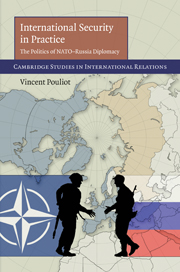Preface
Published online by Cambridge University Press: 03 May 2010
Summary
I have long been convinced that the practice of diplomacy is just as necessary to International Relations (IR) theory as the latter is to the former. While I am far from the first to put forward such an argument, in this book I try to substantiate it with a new perspective on international politics largely inspired by Pierre Bourdieu's sociology. As powerful as theory may be to explain the origins and structure of contemporary practices, abstract models and concepts generally are unable, in and of themselves, to account for the practical logics that make everyday action possible and meaningful. Hence my recourse to practice theory, an oxymoron that aptly captures the particular bent of this book.
One generation after the end of the Cold War, continuing tensions in security relations between the North Atlantic Treaty Organization (NATO) and Russia constitute something of a tragedy in international politics. Despite some progress, both sides have missed a rare opportunity to genuinely pacify and finally move beyond self–fulfilling security dilemmas. Things obviously did not have to go that way; if this book can help explain what went wrong and why in the post-Cold War Russian-Atlantic relationship, it will have achieved more than I can hope. In a pragmatic spirit, my analysis starts with the world as its actors have (erratically) shaped it. I am not normatively attached to current forms of interstate diplomacy and I do hope that better alternatives are in the making.
- Type
- Chapter
- Information
- International Security in PracticeThe Politics of NATO-Russia Diplomacy, pp. xi - xiiiPublisher: Cambridge University PressPrint publication year: 2010

